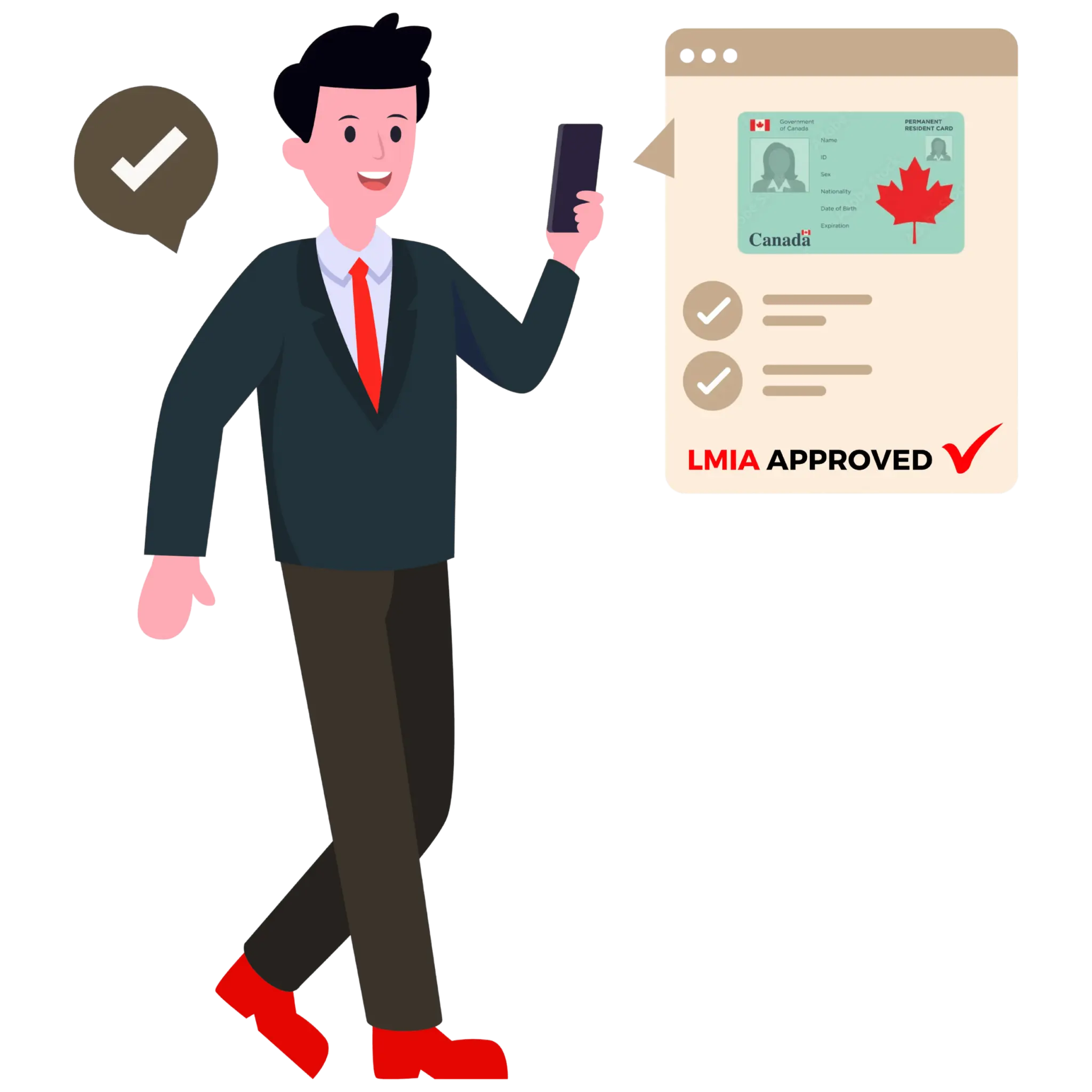If your business in Canada is facing challenges in finding the right talent locally, it’s worth considering the option of hiring foreign workers. This approach can be particularly beneficial when there are not enough Canadian citizens or permanent residents available to meet your workforce needs.
The Canadian Government has established the Temporary Foreign Worker Program (TFWP) to facilitate this process. This program is jointly administered by Employment and Social Development Canada (ESDC) and Immigration, Refugees and Citizenship Canada (IRCC).It offers a structured

pathway for Canadian employers to expand their workforce with foreign talent temporarily.To participate in the TFWP, Canadian employers must first obtain a Labour Market Impact Assessment (LMIA) from ESDC/Service Canada. The LMIA, formerly known as a Labour Market Opinion (LMO), is a crucial document that validates the necessity of hiring a foreign worker for a specific role. It confirms that there is a genuine need for a foreign worker in the job and that no suitable Canadian worker is available to fill the position.
The core purpose of the LMIA process is to ensure that the employment of foreign workers does not adversely affect Canadian citizens or permanent residents who are qualified for the job. A positive LMIA indicates that the employment of foreign nationals in the specified role and location is likely to have a positive or neutral impact on the Canadian labour market. Engaging in this program can be a strategic move for businesses seeking specific skills or expertise not readily available in the local labour market. It opens a global pool of talent, enabling employers to maintain competitive and efficient operations while also adhering to regulatory requirements and supporting the integrity of the Canadian labour market.

This is the first step in the LMIA process where the employer needs to advertise the job position in Canada for a minimum period, typically 4 weeks. The advertisement should be placed in multiple locations to ensure a broad reach. This includes the Government of Canada's Job Bank and possibly other mediums like newspapers, online job boards, and relevant professional associations. This step is meant to ensure that Canadian citizens and permanent residents have the first opportunity to apply for a job.

Following the advertisement period, employers must undergo a recruitment process. This involves collecting and reviewing applications from potential candidates, conducting interviews, and attempting to hire suitable Canadian citizens or permanent residents for the role. The employer must provide a detailed summary of the recruitment efforts, showing that they made substantial efforts to hire domestically and were unable to find a suitable Canadian candidate.

If the employer cannot fill the position with a Canadian worker, the next step is to submit the LMIA application to Employment and Social Development Canada (ESDC). The application involves a detailed submission including the job offer, the reasons for hiring a foreign worker, information about the company, and the results of recruitment efforts.

If you need to modify a pending Labor Market Impact Assessment (LMIA) application, immediately contact Service Canada or the Employer Contact Centre. For changing to a different LMIA stream, withdraw your current application and reapply to the new stream. Remember, processing fees from the original application are non-refundable and cannot be transferred.

The final step is ESDC assessment. During this phase, the government evaluates the LMIA application to determine the impact hiring a foreign worker would have on the Canadian labor market. Factors considered include the genuineness of the job offer, wages and working conditions offered, potential benefits to the Canadian labor market, and efforts made by the employer to recruit Canadian workers. If the assessment is positive, the LMIA will be approved, allowing the employer to proceed with hiring the foreign worker.
The required documents vary based on your business type, location, and the foreign worker’s role. The following checklist provides a general guideline that may vary according to specific circumstances and changes in government programs or requirements.
Advertisement Details: Provide evidence of the job advertisement, including where, when, and the duration for which the position was advertised.
Business Documentation: If this is your first LMIA application, include your business registration or legal incorporation documents. Note that this is not required for employers of in-home caregivers.
Provincial/Municipal Business License: Required for your first LMIA application, except for In-home Caregiver employers.
Canada Revenue Agency (CRA) Documents: Corporations need to submit T2 Schedule 100 (Balance Sheet Information) and T2 Schedule 125 (Income Statement Information) for their first LMIA application. Film, entertainment, and In-home Caregiver employers are exempt from this requirement.
Workplace Safety and Insurance: Provide a clearance letter or certificate from the provincial/territorial workers’ compensation board, if applicable.
Professional Attestations: Attestations from a lawyer or CPA in good standing are needed in certain cases. However, attestations from Chartered Accountants in Quebec are not accepted.
Commercial Lease Agreement: Required where applicable, except for In-home Caregiver employers.
Film and Entertainment Industry: Submit a copy of the employment contract (except for film and TV roles).
Provincial Employer Registration Certificate or Exemption Proof: For British Columbia, Manitoba, and Saskatchewan, you must provide relevant provincial registration certificates or proof of exemption. These provinces have specific laws and registration requirements for hiring foreign workers.
British Columbia: Provincial website: Register to hire foreign workers Provincial law: Temporary Foreign Worker Protection Act
Manitoba: Provincial website: Employer Registration Information Provincial law: Worker Recruitment and Protection Act
Saskatchewan (effective for LMIAs received as of July 31, 2023): Provincial website: Apply for a Certificate of Registration Provincial law: Foreign Worker and Recruitment Services Act
The Recognized Employer Pilot (REP), launched in September 2023, is a 3-year, dynamic initiative aimed at streamlining the hiring process for in-demand jobs in Canada. Specifically designed for employers who regularly engage with the Temporary Foreign Worker Program (TFWP) to fill key roles on the REP occupation list. The REP emphasizes strict adherence to high standards for working, living conditions, and worker protection. Eligibility criteria include:
History of Positive LMIA Decisions: You must have received at least 3 positive LMIAs in the past 5 years for hiring Temporary Foreign Workers (TFWs). You should have 1 positive LMIA from 2022 or 2023, plus 2 more from 2016 if COVID-19 restrictions prevented you from applying for LMIAs in 2020 or 2021.
Adherence to Standards: Your track record should demonstrate high standards for working and living conditions, and worker protection under the Temporary Foreign Worker Program (TFWP).
The application process is straightforward. You only need to submit an LMIA application to apply for REP, with the option to apply for REP included in the same application, requiring no additional information. Eligibility is determined based on your TFWP history. Non-eligibility for the REP still results in an LMIA decision. Benefits for recognized employers include extended validity periods of up to 36 months for positive LMIA decisions. In addition, they have access to a simplified LMIA application process for hiring additional workers. This streamlined process is designed to facilitate the efficient hiring of foreign talent while ensuring compliance with labor standards, benefiting both employers.
Once issued a positive LMIA, it’s the employer’s responsibility to adhere to the terms outlined in the LMIA letter, its annexes, and the Immigration and Refugee Protection Act. Types of LMIA Modifications:
Minor modifications: Changes that do not significantly alter the original LMIA terms.
Examples: Slight job duty alterations, wage increases within specific limits (no more than 2%, the prevailing wage, or the previous year’s inflation rate), and compliance with legislative wage adjustments.
Reporting: While many minor modifications don’t require reporting to ESDC, it’s recommended to report certain changes like administrative errors, contact information updates, and significant employment relationship changes.
Material Modifications: Significant changes that affect the LMIA core terms.
Examples: Job duty changes altering the TEER code, employer changes, wage reductions, substantial wage increases, and modifications to benefits, work hours, or educational requirements.
Action Required: Submit a new LMIA application and disclose any modifications to ESDC.
Voluntary Disclosure: If you’ve made changes that don’t comply with your LMIA’s terms, it’s advisable to voluntarily disclose this information to ESDC to avoid potential penalties like warnings, administrative monetary fines, or bans from the Temporary Foreign Worker Program (TFWP).
Maintaining compliance and avoiding penalties requires proper implementation of LMIA modifications. Whether your modifications are minor or material, understanding your reporting obligations ensures you navigate the process smoothly. For detailed information or to report changes, visit the Temporary Foreign Worker Program website or contact ESDC’s Employer Contact Centre.
ESDSC Contact Number
Canada and the United States: 1-800-367-5693 (Toll-Free)
Outside Canada and the United States: 506-546-7569
Hours of operation: 7:00 am to 8:00 pm Eastern Time, Monday to Friday
As an employer hiring temporary foreign workers (TFWs), it’s crucial to adhere to specific legal requirements, ensuring your business remains compliant and efficient. Here’s what you need to know.
Compliance with the Labour Market Impact Assessment (LMIA): Adhere to the terms and annexes of the LMIA decision letter, as well as the Immigration and Refugee Protection Regulations (IRPR).
Record-Keeping for Six Years: Maintain all documents related to the LMIA, IRPR conditions, and the LMIA decision letter from the first day of the TFW’s employment.
Immediate Notification: Inform the Employer Contact Centre (1-800-367-5693) promptly about any LMIA changes, errors, or variations in TFW working conditions.
Voluntary Compliance: Address compliance issues proactively and notify authorities voluntarily.
Inspection Triggers Under IRPR: An inspection ensures compliance with regulations and may be triggered by: Suspected or previous non-compliance, Random selection, public health concerns.
Inspection Authority and Procedure: Authorities can inspect documents, interview staff, and examine your premises to ensure compliance. Depending on the type of inspection, it could include on-site, virtual, announced, or unannounced inspections, document inspections, interviews, or multi-agency cooperation.
Employer Participation during Inspections: Comply with inspection requirements within specified deadlines by attending, answering questions, and demonstrating compliance.
Key Inspection Focus Areas: Several conditions will be reviewed by inspectors, including, but not limited to, compliance with employment laws, consistency in business activities and job roles for TFWs, effort for an abuse-free workplace, and commitment to LMIA compliance.
Inspection Outcomes and Compliance Results: An inspection will result in either a confirmation of satisfactory compliance or a notice of non-compliance, requiring justification and corrective actions.
Consequences of Non-Compliance: Depending on the violation date and severity, non-compliance penalties include bans from TFW and international mobility programs, financial penalties up to $1 million per year, publication of non-compliance information.
Remember, staying informed and proactive about compliance ensures a smooth and legally sound process for employing temporary foreign workers. Adhering to these guidelines protects your business and supports workers’ fair treatment in Canada.
Can X offer specialized and expert assistance in navigating the complexities of the Labour Market Impact Assessment (LMIA) process, supports employers in securing work permits for their foreign workers, and provides comprehensive compliance services. Our services are designed to cater to the needs of employers, ensuring compliance with the ever-changing LMIA rules, regulations, and requirements, facilitating the work permit application process, and maintaining adherence to compliance standards.
Up to Date LMIA Regulation Monitoring: Can X continuously tracks and researches the latest LMIA changes, keeping our clients informed about impacts on various job categories, durations, exemptions, etc. This is crucial for businesses needing to stay current with Canadian immigration and employment laws.
Eligibility Assessment and Advice: Our team at Can X expertly assesses client profiles, providing personalized advice on their eligibility for an LMIA. We ensure that each client understands the criteria and requirements for a positive outcome.
Assistance with Advertisement Posting: Can X guide clients through the LMIA-required job advertisement process, ensuring compliance with Canadian employment regulations.
Comprehensive Application Support and Legal Representation: Our experienced professionals at Can X assist in preparing and submitting LMIA applications and offer robust legal representation before Employment and Social Development Canada (ESDC).
Work Permit Application Assistance: Can X also helps employers in securing work permits for their foreign workers. Regardless of where the foreign worker is located, our diverse team of experts provides full support throughout the work permit application process, ensuring a smooth and successful experience.
Compliance Services: Can X provide services for ensuring and maintaining compliance. We pride ourselves on the fact that none of our employers have been found noncompliant so far. Our services extend beyond obtaining a positive LMIA; we offer comprehensive solutions including addressing and preparing compliance responses to ESDC inquiries and audits.
Diverse Clientele and Proven Success: Can X has successfully secured positive LMIA results, work permits, and ensured compliance for a wide range of employers, including major corporations and small businesses across various industries.
100% Success Rate for Qualified Employers: Can X proudly boasts a 100% success rate in obtaining positive LMIA outcomes for employers who meet the qualifying criteria. Our unmatched success rate demonstrates our expertise and commitment to excellence.
TFWP allows Canadian employers to hire foreign workers temporarily when there are not enough local candidates
The LMIA is a critical document from Employment and Social Development Canada (ESDC)/Service Canada, required for employers to hire temporary foreign workers. It assesses the necessity for a foreign worker and the availability of Canadian workers for the role.
The standard fee for an LMIA application is $1000 CAD per position. However, there are exemptions, including for permanent residency applications, primary agricultural stream positions under specific TEER codes, and hiring foreign caregivers for individuals requiring assistance with medical needs.
The number of LMIAs an employer can apply for depends on business needs and caps on foreign workers, particularly for lower-skilled roles, and can be influenced by regional unemployment rates.
Obtaining a positive LMIA can be demanding, as it requires demonstrating a genuine labor shortage and the unavailability of Canadian workers. Some sectors, however, may find it easier due to critical labor shortages.
No! The job must be for a full-time (at least 30 hours/week).
Employers can terminate the employment of a foreign worker in line with provincial/federal labor laws and the employment contract. Service Canada must be informed of any termination or change in employment status.
Provincial Labour standards always override the LMIA approval. If the minimum provincial wage is now higher than the LMIA approved wage rate, you need to adjust the worker’s wage rate to match the current provincial minimum wage.
To promote your foreign worker, you first need to go through the LMIA process, obtain a positive LMIA, and have the foreign worker obtain a new work permit for the new position.
Adjusting wages for a foreign worker post-hiring can lead to compliance audit issues, especially if a higher initial wage might have attracted local candidates. However, employers can increase wages if the government’s prevailing wage rate for that job and location changes. To accommodate regular pay raises, employers can specify this in the LMIA application, allowing for equality in pay increases between foreign and Canadian workers. This ensures compliance and equitable treatment in the workforce.
You can submit LMIA application up to six months prior to the expected job start date.
The time to process a LMIA varies by application type and is averaged across Canada’s processing centers. For current LMIA processing times, please refer to the official LMIA application processing times page.
Yes, but the type and extent of the changes determine how to proceed. ESDC might not require reporting for minor modifications that don’t significantly alter the original terms. If you make material changes to the LMIA, you must submit a new application to ESDC and disclose the changes.
In a minor modification, the original LMIA terms are not significantly altered, such as slight job duty alterations, wage increases within limits, or compliance with legislative wage adjustments. ESDC does not require reporting many minor changes, but it recommends reporting administrative errors, contact changes, and significant employment relationship changes.
Changes in job duties, TEER codes, employer changes, wage reductions, substantial wage increases, and modifications to benefits, work hours, and educational requirements are all considered material modifications.
You should submit a new LMIA and disclose any modifications to ESDC.
Voluntary disclosure involves proactively informing ESDC of changes that don’t comply with LMIA. You can avoid potential penalties like warnings, administrative monetary fines, or TFWP bans by doing this.
For LMIA-related inquiries, contact ESDC’s Employer Contact Centre. In Canada and the United States, call 1-800-367-5693 (Toll-Free). Outside Canada and the United States, call 506-546-7569. Hours of operation are 7:00 am to 8:00 pm Eastern Time, Monday through Friday.
Non-compliance with LMIA terms can lead to penalties like warnings, administrative monetary fines, or bans from participating in the Temporary Foreign Worker Program (TFWP).
Start your adventure: Explore immigration policies, services, and resources…